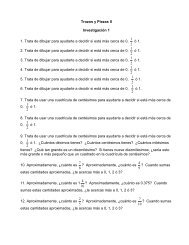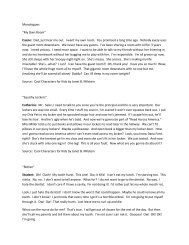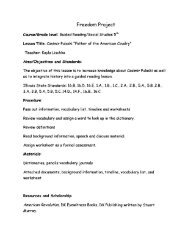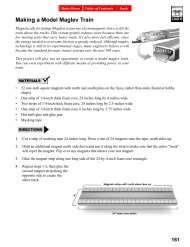Fit Family Task Force Project - Rockford Public Schools
Fit Family Task Force Project - Rockford Public Schools
Fit Family Task Force Project - Rockford Public Schools
Create successful ePaper yourself
Turn your PDF publications into a flip-book with our unique Google optimized e-Paper software.
music from around the world are used with each unit so that students appreciate<br />
the musical sounds that have evolved as cultural expressions in diverse regions<br />
of the world. This promotes music appreciation as well as understanding of basic<br />
rhythms and instruments.<br />
The approach of FIE in introducing food and nutrition concepts is pleasure-<br />
oriented rather than fear-based. Kids get “turned on” to experiencing health-<br />
promoting foods they may not be familiar with, rather than “turned off” to<br />
nutrition. FIE does not stigmatize students for their weight or size and promotes<br />
positive body images. The skills students learn through FIE have direct practical<br />
application, will enhance their life skills, improve their quality of life, and will<br />
encourage an appreciation of people around the world and cultural diversity.<br />
Study Design & Intervention<br />
The specific aims of the <strong>Rockford</strong> <strong>Fit</strong> Families pilot study are to test the<br />
hypothesis that positive classroom education about food, nutrition, and<br />
agriculture along with parent/community education will increase dietary<br />
acceptance of healthy foods and will build a wellness community environment<br />
that will grow and become sustainable after three to five years with buy-in from<br />
all of the key players so that the program becomes economically and<br />
programmatically viable. Another hypothesis tested is that sensory-based<br />
learning (engaging the senses) through hands-on experience with health<br />
promoting foods will be learned easier by the students because it addresses<br />
different learning styles that are not often engaged in a traditional academic<br />
setting.<br />
This study addresses the needs of low-income communities by utilizing a<br />
curriculum that is fun, does not blame or shame people, but empowers them<br />
through experiential education to learn to pleasures of delicious whole foods and<br />
how they make one feel when consumed (students keep food journals) along









